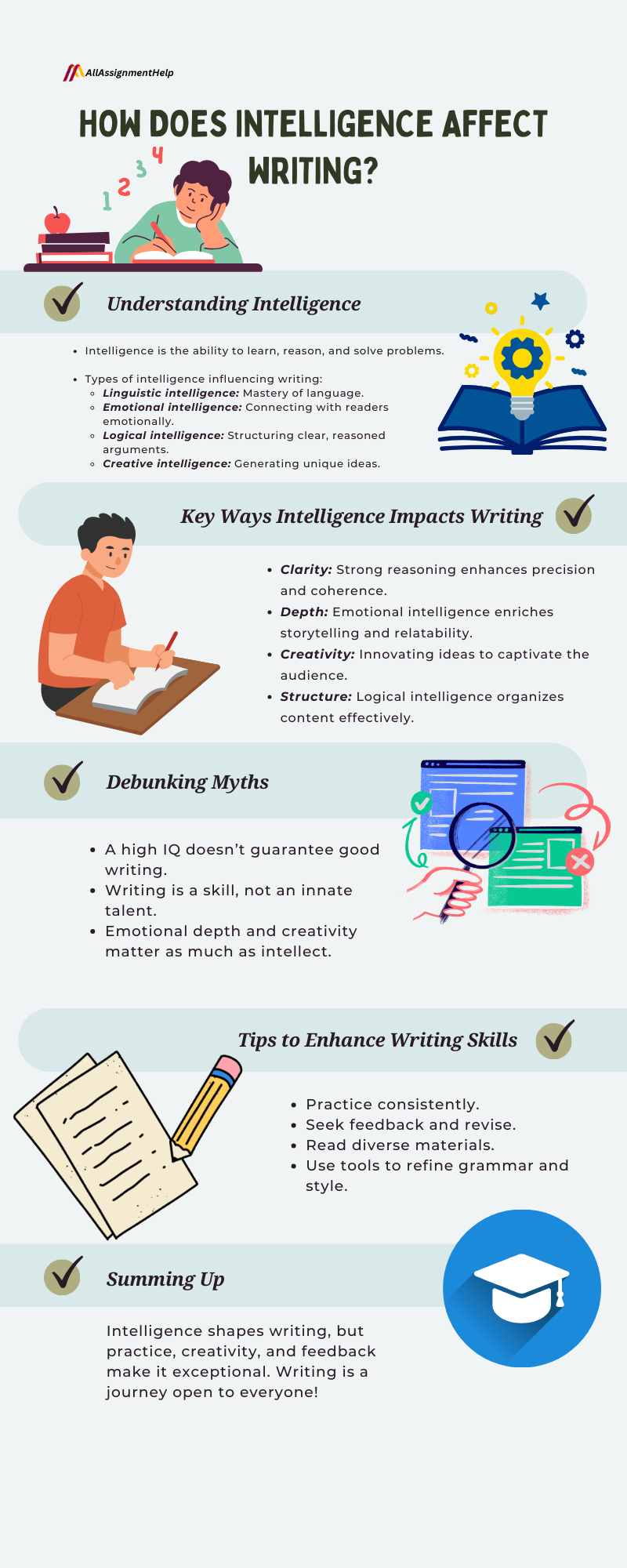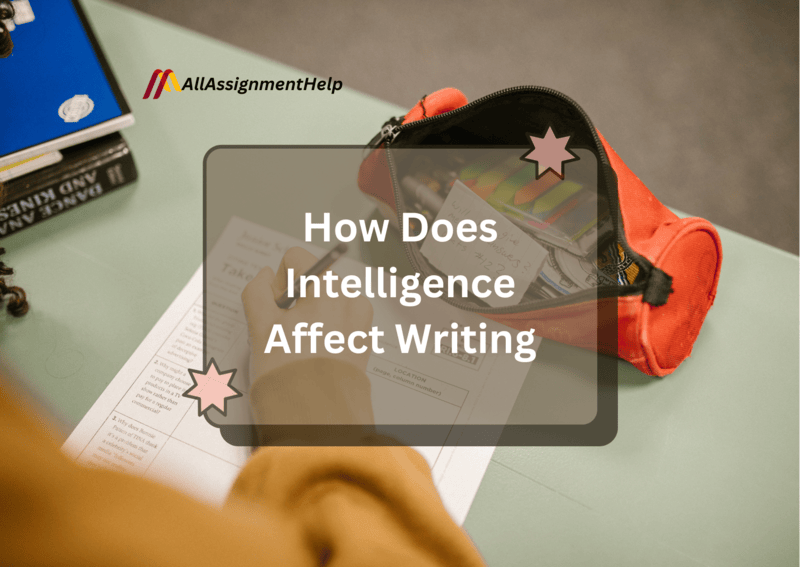Table of Contents
Excellent writing reflects a thinker, a creative and a good communicator. But in what way does intelligence affect writing? Even though intelligence is frequently seen as the highest level of cognitive ability, it affects all aspects of writing, from creating compelling arguments to creating vivid character biographies.
Linguistic, emotional, or logical intelligence enhances writing quality, but things are not that simple. Practice and creativity also have their roles. In this blog of All Assignment Help, we will discuss how intelligence affects writing and the necessary points that help in delivering great writing.
What is Intelligence?
When it comes to intelligence, it is not simply a matter of IQ points or grades. It includes learning, reasoning, problem-solving, and adaptability. Moreover, more than one classification of intelligence exists in psychology. For instance:
- Linguistic intelligence: The ability to use language well, in writing and in speech, for comprehension.
- Logical-mathematical intelligence: The ability to think logically and solve problems.
- Emotional intelligence: Learn how to understand and manage emotions to start connecting with others better than you do now.
- Creative intelligence: Capacity for original ideas and imagination.
These varieties of intelligence play a role in the way a person writes influencing style, structure, tone, and level of depth.
Also read: How Foreign Education Affects the Economy of the USA
The Connection Between Intelligence and Writing
The intelligence that goes into writing, the distinct cognitive and emotional abilities that define one’s writing style, influence what a person will write in a text. Below is how various sorts of intelligence affect writing:
- Linguistic intelligence: Writers with linguistic intelligence write tightly focused, lively, and clear content, manipulating vocabulary and grammar like a maestro.
- Logical intelligence: Whether assembling a structure of a crude argument, arranging the content, or giving thought-out arguments backed by evidence, logical thinkers are the best.
- Creative intelligence: This gives characters, stories, or compelling arguments in life and promotes imagination and creative storytelling.
- Emotional intelligence: High emotional intelligence allows writers to create work that connects closely with readers as it is based on empathy and tone.
All these forms of intelligence work together to shape our writing, not only in regard to what we write but how well we communicate it to the audience.

Does High Intelligence Guarantee Good Writing?
While it is by no means a guarantee, intelligence is a necessary condition for excellent writing. Even if intelligent people possess strong reasoning, a large vocabulary, and a great deal of inventiveness, good writing is not just about intelligence. Other factors like discipline, practice, and audience awareness are as crucial.
As an example, a person that is very logical might struggle with emotional tone, and while they are perfect as far as structuring the argument, their writing will seem too dry. On the other hand, someone who has the knowledge might write thick, hard-to-read stuff without clarity whatsoever. Weaving the different elements of writing into a skill that merges intellect with their implementation process is a function of effort, feedback, and the ability to adjust which any human can develop.
Also read: Effective Ways to Close the Achievement Gap
The Role of Intelligence in Different Writing Styles
Different styles of writing reflect different intelligence and skills needed for the writing process. So, here is how the types of intelligence help you to define your unique writing styles:
Academic writing
Logical-mathematical intelligence and linguistic intelligence are well-suited for academic writing. Logical reasoning assists writers in organizing arguments, interpreting facts, and proposing conclusions in an orderly manner. Moreover, linguistic intelligence guarantees clarity, precision, and support for grammatical formality. It needs creativity and the Rigor of academic writing, which means you must be original, but at the same time objective and professional yet use a human-like tone.
Creative writing
Creative intelligence and emotional intelligence both play a huge role in creative writing. Innovation is driven by creative intelligence which empowers writers to think up intriguing stories, lively imagery, and original characters. The emotional intelligence of bringing complex emotions to life makes the storytelling topic resonate and fun to read.
The writers in this field need to use their own creativity and must feel a strong emotional connection, so a reader should also feel that connection and can feel a different world away from Earth. However, if you are a student with writing deadlines, you can hire experts online and receive the best help with assignments. Professionals can provide you with top-notch paper without missing the deadline.
Professional writing
Professional writing involves a combination of linguistic intelligence and interpersonal intelligence, like reports, emails, business proposals and so on. They are required to articulate information in an informative, succinct, and persuasive style. It goes having a good knowledge of who your audience is, as tone and language used directly relates to the purpose: inform, persuade, or teach. The intelligence of writing style varies from one business context to another, which makes it a valuable attribute to possess in this situation.
Technical writing
Logical intelligence and spatial intelligence are in technical writing, particularly in explaining complicated processes or making pamphlets that can easily be understood. While logic helps you outline the steps in an organized manner, be it for a presentation, or an essay, spatial intelligence helps you visualize things and explain complex or technical topics proficiency. This type requires precision and simplicity so readers can quickly understand and put the information into practice.
Personal or reflective writing
Behind reflective writing lies the intelligence of feeling, or of interpersonal intelligence. It is a form of writing where writers reflect upon their own thoughts and experiences and how these relate to larger themes. This approach promotes self-reflection and disclosure and gives readers unfiltered access to the author.
Lastly, all the writing styles are enhanced in ways unique to each style through intelligence, revealing parallels in the mindset of the writer. However, the secret to writing success is in identifying and cultivating the unique types of intelligence that are best aligned with the way you like to write. This guarantees that a synergy of skills, creativity and impact occurs.
Tips to Enhance Writing Skills Irrespective of Intelligence
Although having a high IQ may help facilitate the process of writing well, everyone can write beautifully with the right approach and practice. These tips will help you develop your writing apart from your producing skills:
- Practice regularly: Write for practice, to improve fluency, and to fine-tune your style.
- Read more: Read a variety of genres covered by different authors. This will help you expand your vocabulary and learn various writing techniques.
- Get peer review: Show it to peers or mentors and take constructive feedback to further improve.
- Proofread your work: Go through drafts to correct mistakes, increase clarity, and guarantee flow.
- Study examples: Find some good writing and think about why it is so successful and how you can do the same
- Focus on your audience: Be mindful of what your readers want to see and sound and look accordingly.
- Develop emotional intelligence: Cultivating empathy is key to being able to connect with your audience and write engaging stories.
- Try different styles: Test out different forms and genres of writing to discover what works for you and develop range.
- Use writing tools: Use tools such as grammar checkers and style guides to refine your writing.
- Stay persistent: Keep writing, it is a learning process, and you still have a long way to go.
In addition to this, if you urgently need assistance in writing, it is advised to hire expert assignment writers to obtain advanced quality writing without any hassle.
Common Misconceptions About Intelligence and Writing
There is a strange reader-writer gap regarding the link between writing and intelligence with many myths being created in the process. Let us bust these myths.
Myth 1: Writing is only for the genius
It is widely assumed that great writing needs a great brain. The truth is that writing is a skill that anyone can master with enough practice, discipline, and constructive criticism, no matter how high the IQ is.
Myth 2: If you are smart, you are a good writer
Intelligence helps you make sense of ideas and sequence them. However, creativity, emotional awareness, and audience perspective enable you to write well, all of which have no relation to intelligence.
Myth 3: Writing is an easier task for high-IQ writers
Perhaps intelligence is part of the puzzle, but even the most brilliant writers will continue needing to practice their craft and continue developing their craft. Writing is a skill that develops over time and is sharpened with consistent practice.
Myth 4: The logical thinkers cannot be creative writers
Creativity is generally perceived as being at odds with logical intelligence. But a logical thinker can learn to balance logic and creativity to construct creative, compelling stories.
Myth 5: Emotional intelligence does not matter in writing
Some people assume writing is technical and they can skip the emotion. What real content creation really comes down to is emotional intelligence, the ability to connect the reader with content to craft great and meaningful pieces.
If writers take note of these misperceptions, they can concentrate on cultivating the various talents and traits that make a great writer not just smart. However, in case of writing difficulties, you can always seek assistance from online assignment service.
Struggling to Focus on Online Classes While Managing Assignments?
When taking online courses and writing assignments at the same time, many students find it difficult to manage their time. In such circumstances, they look for additional guidance to take care of their online classes or assignments. It might be time to look for wise choices if you need to make needed adjustments. From hiring experts from reliable websites to finish their assignments to hiring experts from online class services to take care of their online lectures, students need it all. Therefore, sharing your queries like, who can I ask to take my online class for me, with reliable online class help websites can relieve some of the stress and you can concentrate on your writing while still fulfilling your academic obligations. Managing your assignments and courses will be easier if you work with the proper experts.
Conclusion
While writing, intelligence affects writing, it still has roots in how we think, create, and communicate ideas. Still, that is not the only reason that makes you a good writer. Although language, logic, emotion, and creativity do play a role in different writing styles, so do practice, perseverance, and critique in perfecting the craft. Anyone can become a better writer, not because writing equals intelligence but because writing is a skill. Through welcoming growth, drawing inspiration from our peers and pushing our boundaries, we become better writers and deliver more impactful stories to our readership.
Frequently Asked Questions
| Question: Does intelligence determine how well someone writes? Answer: You would think writing takes a lot of intelligence, well! That is true. Alongside this, becoming a good writer also requires practice, creativity, and feedback. |
| Question: Can someone improve their writing skills without being highly intelligent? Answer: Yes, absolutely! Anyone can write, skilled writing can be honed and improved over time through practice, research, and ongoing feedback, to learn and apply lessons along the way. |
